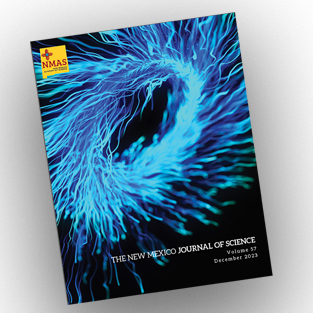NEWS
Externship Report: Katie Zemlick

The Externship Program is a research exchange program that allows New Mexico graduate students (with an existing assistantship) to spend a semester or summer doing research at a partnering New Mexico university or research facility. This report is from University of New Mexico student Katie Zemlick about her time as an extern at Los Alamos National Laboratory.
The goal of my graduate research is to better understand water requirements for energy production in New Mexico, which includes water used and produced during oil and gas production. The latter of the two, commonly referred to as produced water, is the largest volume waste stream generated by the industry. There is increasing interest in utilizing it for oil and gas production rather than fresh water, a scarce and valuable resource in New Mexico. In addition to reducing stress on fresh water resources, reuse of produced water may reduce the possibility of disposal-induced seismicity as well as fresh water procurement and disposal costs.
In an externship funded by NM EPSCoR, I was given the incredible opportunity to work on produced water research with Dr. Jeri Sullivan Graham, a hydrogeologist and geochemist at Los Alamos National Laboratory. Dr. Graham is a preeminent produced water researcher and water treatment expert, as well as a science advisor to the state energy secretary. Under her supervision, I worked with staff at the Oil Conservation Division (a division of the Energy Mining and Natural Resources Department) to collect produced water quantity and quality data and better understand existing and proposed management practices. With Dr. Graham’s help, I was able to connect with those in both the energy production and water treatment industries in order to quantify the energy and costs associated with produced water treatment, disposal, and management.
As a result of this experience, I was able to construct a model of the financial and energy costs associated with conventional produced water management (i.e. fresh water use for production and disposal of produced water) and future management strategies which may involve treatment and reuse of produced water in oil and gas operations. The outcomes of this research have been presented in one conference paper and four conference presentations.
This externship provided me with the opportunity to focus on an integral part of my dissertation research as well as the ability to learn from experts in academic, regulatory, and industry fields. In addition, working with Dr. Graham was one of the most valuable of my graduate career. Her guidance, willingness to discuss, critique, and evaluate my work, as well as her encouragement of my research goals made this summer and this externship a truly unforgettable experience. I will be forever grateful to NM EPSCoR and Dr. Graham for making this externship possible.


